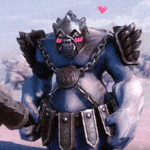|
Gerblyn posted:I’m not disagreeing with what you’re saying at all, I think I expressed myself badly. When I used words like Smart, I didn’t mean Smart like Napoleon destroying the player with searing strategic insight, I meant Smart like another human playing a reasonably competent game. Yeah, I think we're ultimately agreeing, just different ways of saying the same thing  What I meant is that - I don't know that the challenge in successfully executing fun single-player 4X games is an engineering/AI challenge, and thus the 4X genre wouldn't become drastically more enjoyable for players if it leveraged cloud computing, which probably makes it not worth the cost? What I meant is that - I don't know that the challenge in successfully executing fun single-player 4X games is an engineering/AI challenge, and thus the 4X genre wouldn't become drastically more enjoyable for players if it leveraged cloud computing, which probably makes it not worth the cost?Again, like you're saying, I think it's the secret to good SP 4X is the design challenge of making something like Sorcerer Kings, where the game is inherently asymmetric, because even if you perfectly simulate a human player, part of the satisfaction of winning a symmetric PvP game is knowing you outsmarted a human. I would bet that most people would find beating an AI in one of these symmetric PvP games less satisfying? Hard part is, there's not a ton of 4X games that have tried something asymmetric to compare against! 
|
|
|
|

|
| # ? Apr 19, 2024 06:52 |
|
Mother posted:A lot of places (not just games) are silly with data. You’d be surprised (or maybe not) at how many people in high-level positions don’t ask questions about numbers they are handed if the presentation looks pro. i haven't ever worked in the games industry but if it's anything like every other job i've ever worked in, and anecdotes like this one lead me to believe this is the case, i will always remain skeptical of arguments about how "well brown shooters/microtransactions/whatever are clearly the money makers why do you think ea and activision are doing it
|
|
|
|
Lutha Mahtin posted:i haven't ever worked in the games industry but if it's anything like every other job i've ever worked in, and anecdotes like this one lead me to believe this is the case, i will always remain skeptical of arguments about how "well brown shooters/microtransactions/whatever are clearly the money makers why do you think ea and activision are doing it Five years ago, EA's stock was trading around $14/share. Today it's at 106. In 2014, their net income was 9 million, in 2017 their net income was 967 million. You can be skeptical all you want but, by every meaningful metric, their business strategy works. I say this as someone that deeply wishes it wasn't.
|
|
|
|
Gearman posted:Five years ago, EA's stock was trading around $14/share. Today it's at 106. In 2014, their net income was 9 million, in 2017 their net income was 967 million. You can be skeptical all you want but, by every meaningful metric, their business strategy works. I say this as someone that deeply wishes it wasn't. It's not like they were small fry in 2014, either. Kinda depressing.
|
|
|
|
Gearman posted:Five years ago, EA's stock was trading around $14/share. Today it's at 106. In 2014, their net income was 9 million, in 2017 their net income was 967 million. You can be skeptical all you want but, by every meaningful metric, their business strategy works. I say this as someone that deeply wishes it wasn't. if you think "every meaningful metric" is a couple of random stock market attributes picked from arbitrary years, i really don't know what to tell you
|
|
|
|
I was skeptical of that 100-fold profit increase in 3 years story too, so I pulled EA's 2014 10K filing to compare previous years. 2014 : $9m 2013 : $98m 2012 : $76m 2011 : -$276m 2010 : -$677m It checks out: their margins have absolutely exploded as a result of microtransactions.
|
|
|
|
Lutha Mahtin posted:if you think "every meaningful metric" is a couple of random stock market attributes picked from arbitrary years, i really don't know what to tell you It is the most meaningful metric for those in the final decision making positions. Again, I think these lines of debate have lost sight of their thesis statements and are just now about going "no, but what I think is true because of data". I'm not even sure what points people are trying to make anymore.
|
|
|
|
shame on an IGA posted:I was skeptical of that 100-fold profit increase in 3 years story too, so I pulled EA's 2014 10K filing to compare previous years. Yeah, there really isn't any room for debate here. EA's business strategy has proven to be extremely effective for the better part of a decade.
|
|
|
|
mutata posted:It is the most meaningful metric for those in the final decision making positions. I don't know if I've explicitly said it but one thing I've been trying to point out is that big, existing industry leaders, whether in games or something else, didn't get to the position they are in because they are the sole captains of industry who are smarter and more rational than everyone else. Pointing to a couple of arbitrary data points on (in this case) EA's ticker readings and SEC filings really means nothing. This is because EA, much like any other large multinational corporation, is affected by a huge number of variables every single day. They are affected by changes the economy and stability of every country they do business with, changes in all the laws and regulations of these countries, mergers and acquisitions (and divestitures) of their own and of competitors, the growths and failures of competitors, internal reorganizations, and I could go on for quite a bit longer here but I think anyone arguing in good faith would see my point. And this is even before we consider the general monopoly nature of the games business and the entertainment business in general (in terms of copyright, trademarks, and patents), the monopoly nature of the console business, and so on. We don't live in an Ayn Rand libertopia where "smart man -> business decision -> more profit -> better than" and I think it really obscures the bigger picture when people discuss it that way.
|
|
|
|
so how would you go about judging the success of the microtransaction business model?
|
|
|
|
Lutha Mahtin posted:I don't know if I've explicitly said it but one thing I've been trying to point out is that big, existing industry leaders, whether in games or something else, didn't get to the position they are in because they are the sole captains of industry who are smarter and more rational than everyone else. Pointing to a couple of arbitrary data points on (in this case) EA's ticker readings and SEC filings really means nothing. This is because EA, much like any other large multinational corporation, is affected by a huge number of variables every single day. They are affected by changes the economy and stability of every country they do business with, changes in all the laws and regulations of these countries, mergers and acquisitions (and divestitures) of their own and of competitors, the growths and failures of competitors, internal reorganizations, and I could go on for quite a bit longer here but I think anyone arguing in good faith would see my point. And this is even before we consider the general monopoly nature of the games business and the entertainment business in general (in terms of copyright, trademarks, and patents), the monopoly nature of the console business, and so on. We don't live in an Ayn Rand libertopia where "smart man -> business decision -> more profit -> better than" and I think it really obscures the bigger picture when people discuss it that way. Ok. I mean, I don't really think you're using the word "monopoly" correctly here, but you're right that there are many, many factors that feed into the success of a company. What's your point though? People in this thread have drawn a line from "uses microtransactions" to "makes 20 times the profit" and used financial figures (albeit general ones) to back that up. What are you positing?
|
|
|
|
shame on an IGA posted:I was skeptical of that 100-fold profit increase in 3 years story too, so I pulled EA's 2014 10K filing to compare previous years. 
|
|
|
|
Lutha Mahtin posted:I don't know if I've explicitly said it but one thing I've been trying to point out is that big, existing industry leaders, whether in games or something else, didn't get to the position they are in because they are the sole captains of industry who are smarter and more rational than everyone else. Pointing to a couple of arbitrary data points on (in this case) EA's ticker readings and SEC filings really means nothing. This is because EA, much like any other large multinational corporation, is affected by a huge number of variables every single day. They are affected by changes the economy and stability of every country they do business with, changes in all the laws and regulations of these countries, mergers and acquisitions (and divestitures) of their own and of competitors, the growths and failures of competitors, internal reorganizations, and I could go on for quite a bit longer here but I think anyone arguing in good faith would see my point. And this is even before we consider the general monopoly nature of the games business and the entertainment business in general (in terms of copyright, trademarks, and patents), the monopoly nature of the console business, and so on. We don't live in an Ayn Rand libertopia where "smart man -> business decision -> more profit -> better than" and I think it really obscures the bigger picture when people discuss it that way. Is your position that executives and the boards of major corporations are not responsible for their profits, and do not make decisions based on their best belief to increase their profits and margin? Or is your position that it does not appear to rational people that micro transactions in games is beneficial to long term customer value? Because I don’t believe either of those is true, and most of the higher ups I’ve interacted with seem similarly inclined.
|
|
|
|
One thing I can say for sure is that's it's frustrating when a smaller company like the one I work for looks at the trends that are making the top dogs billions of dollars and says "this is how you make money now, and we if do that too then we'll be successful" and then tries to copy the latest trends as closely as possible with none of the funding or resources to back it up. A lot of executive-types seem to think that there's something magical about whatever techniques are currently making lots of money such that you can turn a big profit with them even when developing on a shoestring budget.
|
|
|
|
Triarii posted:One thing I can say for sure is that's it's frustrating when a smaller company like the one I work for looks at the trends that are making the top dogs billions of dollars and says "this is how you make money now, and we if do that too then we'll be successful" and then tries to copy the latest trends as closely as possible with none of the funding or resources to back it up. A lot of executive-types seem to think that there's something magical about whatever techniques are currently making lots of money such that you can turn a big profit with them even when developing on a shoestring budget. The trick to the plans used by the big players is they have huge ad budgets. And the storefronts return their calls when they ask about featuring.
|
|
|
|
I have spent a huge chunk of my life playing games, almost all single-player. I finish maybe 1%, because by halfway through either there is no longer a challenge or the gameplay has become repetitive. When I've gotten to see all of the gameplay mechanics, if not the story, then starting the next game becomes more appealing. I finish 99% of books and movies because I know the ending is a huge part of the experience and will completely change the way I view it. My assumption is that most of the artistry in a game goes into the gameplay, not the story, so I've "gotten" almost all of a game by halfway through. Is this a cool and good way to experience games? Or is a ton of work going into the last third of the game, carefully managing difficulty curves, writing elaborate plot twists, and varying mechanics to avoid repetition, that I've just written off after a few stale experiences? I would hate to think that I'm often missing out on fresh gameplay and book-level plot twists at the 11th hour. But no matter what, as much as I love 4x, I am still always going to restart as a new faction once I own half the map!
|
|
|
|
teardrop posted:I have spent a huge chunk of my life playing games, almost all single-player. I finish maybe 1%, because by halfway through either there is no longer a challenge or the gameplay has become repetitive. It depends on the genre. In some games (like platformers), level design is vitally important, and the interesting stuff may not appear until near the end or post-game content. I wouldn’t want to jump out of a game just after the tutorial. In [the current form of] Diablo 3, the interesting part of the game is in progressing through greater rifts; this is entirely in post-game content. If you’ve seen enough of a game though, you shouldn’t feel obliged to finish it. Same for books, movies, and albums.
|
|
|
|
It's funny you should say platformers, the last game I finished was Psychonauts. Level design did stay fresh until the end. I would never leave a book, movie, or album unfinished (unless it was really bad), because the author is able to surprise me right up to the end. In a game, although a Gravity Gun might end up getting supercharged, it's rare to withhold anything really radical. I know I'm not going to beat Sleeping Dogs and find myself in Shadowrun: Hong Kong building a spaceship that launches me into Stellaris! The experience of playing a game is primarily exploring and interacting with the world which has been created, and devs can't waste the resources to make 2 worlds when they could make 2 games instead, so overwhelmingly this seems to leave the second half as a mirror image of the first half. Protagonist grows from doing 1 damage to 10 damage, someday he may deal 20 damage and defeat the end boss and save the world. I haven't played Diablo 3, but how is playing those endgame rifts and optimizing your gear different from the rest of the game? Could you give me any other examples (don't need to be recent) of games that definitely aren't mirror images, that might surprise me with the late game?
|
|
|
|
teardrop posted:It's funny you should say platformers, the last game I finished was Psychonauts. Level design did stay fresh until the end. The nature of what you’re doing and the strategies involved are just different. The gear you get (and would have trouble getting before) fundamentally alters your character’s skills. Frog fractions [no explanation will do it credit]. Dance Dance Revolution [self evident, but maybe not worth picking up]. Disgaea [game starts as a tactics RPG, but it turns into an exploration in methods to break its systems]. If I thought longer, I’m sure I could come up with others.
|
|
|
|
teardrop posted:I have spent a huge chunk of my life playing games, almost all single-player. I finish maybe 1%, because by halfway through either there is no longer a challenge or the gameplay has become repetitive. I think something that might be useful for you might be taking a hard look at what you find interesting in games. Everyone seeks something different from the experience, but knowing what you want out of a game, explicitly, can clear the path. For example, if you need a narrative, a story, and characters to carry you through a game, it immediately crosses off things like Cities: Skylines. If you want a definitive ending and don't want a 'forever' game, maybe Diablo III isn't your jam. If mechanical skill isn't your strong suit, then Starcraft II, Dota, or Tekken 7 might need something else to carry them. For me, I know I don't really care about narrative, and I really enjoy mechanical mastery and am willing to pay a complexity tax upfront to get involved in systems that offer a lot of depth. I want a game that makes me think hard about it's systems. To that end, I find that I really enjoy Path of Exile and Factorio. I also really like the aspect of Discovery that games like Dark Souls offer - I play those games and roguelikes as a result. Conversely, I hold games to a very high technical standard - While BotW might have delivered on adventure and Discovery, it controls like rear end and it wrecked the experience for me. In the future, this will be something I investigate before buying other games. I think that kind of introspection is very useful though for determining what really clicks with you and what doesn't. The are so many great games now that if you can accurately identify what you value in a game, you can almost certainly find a game that you feel was made especially for you (and then finish, of course  ) )
|
|
|
|
teardrop posted:When I've gotten to see all of the gameplay mechanics, if not the story, then starting the next game becomes more appealing. I finish 99% of books and movies because I know the ending is a huge part of the experience and will completely change the way I view it. My assumption is that most of the artistry in a game goes into the gameplay, not the story, so I've "gotten" almost all of a game by halfway through. Speaking as a gamer, rather than a developer, I think that you're right in that a game has a certain amount of gameplay in it, and that's a different thing to the amount of content in it. If I'm playing the newest Assassin's Creed game, I might have experienced all of the gameplay the game offers in the first 15 hours, while there's enough content to drag the game on for 40 hours, meaning I'm fairly bored for the last 25 hours, and may well just not finish the game. I was speaking to some colleagues about this, and someone suggested it's a factor of where I am in life. I'm an adult who has a fair amount of disposable income, so I can afford to pick up a game, play it for a while, say "That's it!" and buy something else. My time is more valuable than my money, so I'll spend more on new games to have a better time. A lot of people aren't in that position though, they might only buy 1 or 2 games month, maybe less. Those people want to play a game for 80+ hours, because it's the only game they'll have for a month, and if it's over in 15 hours, they'll feel ripped off. To answer your question, in my experience, more work tends to go into the beginning of the game than the later parts. There are bunch of reasons for this, like the beginning parts of the game are the ones shown to the press and to publishers in order to impress them. Also, if the first half of your game sucks, people will never finish it and will likely go complain on the internet about what a bad game it is. However, if the first half is good and the second half sucks, people are more likely to give it a pass, since they'll have gotten more enjoyment out of it. Finally we know from various metrics (like achievements) that the vast majority of gamers never finish games, so it makes sense to invest more in the parts of the game that the most people will play. This isn't universal, of course, I thought the latest South Park game had far better content at the end than for it did for the first 75% for example, just a sort of tendency.
|
|
|
|
I also wonder how many gamers stick with games just for the sunken cost fallacy. Like they already put 20 hours into a game so they feel they must finish it. Or if the game has no ending like LoL or Hearthstone then it just becomes a loop.
|
|
|
|
Hi, Just discovered this thread and will go back and read through it. I’ve been in the industry for 18 years now, worked for pretty much every major publisher except Ubisoft (EA, WB, Sony, Activision) in many types of games, (Shooters, MMOs, RPGs, Mobiles) My biggest comment that I’d make from where I’ve read through so far is that for some places crunch is so engrained that it’s not even considered crunch. I was talking to some of the Shadow of Mordor people a few years back, (Right after the first game shipped.) and they said things were going great and they weren’t even crunching for the new title yet, just 60 hour weeks...
|
|
|
|
Chernabog posted:I also wonder how many gamers stick with games just for the sunken cost fallacy. Like they already put 20 hours into a game so they feel they must finish it. Or if the game has no ending like LoL or Hearthstone then it just becomes a loop. This hit me hard with single player open world games. The longer a story driven game pulls on, the more i tend to expect the payoff of the story to blow my face off and while there have been a few (jesus, Nier: Automata did), there have been plenty like farcry 3, farcry 4, mgs5, fallout 3 and 4 , skyrim, etc that just drag on way long and haven't a hope. I kept going in those games with that expectation and
|
|
|
|
Gerblyn posted:Speaking as a gamer, rather than a developer, I think that you're right in that a game has a certain amount of gameplay in it, and that's a different thing to the amount of content in it. If I'm playing the newest Assassin's Creed game, I might have experienced all of the gameplay the game offers in the first 15 hours, while there's enough content to drag the game on for 40 hours, meaning I'm fairly bored for the last 25 hours, and may well just not finish the game. I can't point to any figures, but it seems to me that over the last decade adding progression systems (or RPG elements or whatever people are calling them) has become more and more popular across genres. At the same time, I also feel like the gap between length of content and length of gameplay has widened in many cases, particularly in AAA open world games; I assume that this is partially a result of distributed development and the fact that more bodies can be thrown at (or rotated on to) generating content for a project while its harder to do the same for systems development. I feel like these two things may be related (progression can keep you invested when new gameplay runs out), but I could be talking out of my rear end.
|
|
|
|
In Skyrim there was a meme about the voice line "I used to be an adventurer like you, but then I took an arrow in the knee." This is a reasonable line of dialog to have some character say somewhere once in the game, but for some reason the line got recorded many times in many different voices and then given to the ultra-common town guards as one of the 5 or so things they'd say repeatedly. Hence, the meme. Does anyone have any insight into why something like this happens? Why record the same line in different voices, rather than just some other banal phrase?
|
|
|
|
The short answer is that everything costs money so fewer things cost less money. Also, was that line really recorded in multiple voices? I only remember the one. (I wouldn't be surprised though). Also, I'm betting that there are a TON more than just 5 other lines and people latched on to that one because memes so it eclipsed all others. Likely a certain class of characters was given a library of generic response lines to pull from and that was in that library.
|
|
|
|
mutata posted:The short answer is that everything costs money so fewer things cost less money. Also, was that line really recorded in multiple voices? I only remember the one. (I wouldn't be surprised though). It strikes me as very odd that recording voice actors would be cheaper than writing/translating a few more lines of generic dialog.
|
|
|
|
I'm not sure, obviously, but they likely wrote a big list of generic lines and then just had multiple voice actors record off of that list. It most likely wasn't a question of "Ok, we finished Voice Actor Harry's list, now let's write Voice Actor Joe's list" but more like "Ok, Voice Actor Harry, we've finished the 3 characters you'll be voicing but we're still paying for another hour of your time. Would you mind doing some lines from our generic list for us?"
|
|
|
|
ShadowHawk posted:I didn't play much skyrim but they've definitely done the same line in multiple voices for the Fallout games as well. Basically what was said above. You get sheet A of “Generic responses” and you have the person read through them in about 10 minutes. Then sheet B of “Unique dialog” that they read through in another 10 minutes. Then you send them on their way. They’re an industry minimum for their time and is done usually months before the game ships so hope sheet B didn’t have too much plot info that is going to be changed / fine tuned in post. (See also their union striking against video game publishers for the past year.) I remember the worse for this was a project with Laurence Fishburne where like 90% of the dialog recorded was invalidated with the first DLC after we’d brought him in 2-3 times during production.
|
|
|
|
How many different stock foley sound libraries are out there? I still hear sfx from Goldeneye 64 popping up in movies and tv at least once a week.
|
|
|
|
shame on an IGA posted:How many different stock foley sound libraries are out there? I still hear sfx from Goldeneye 64 popping up in movies and tv at least once a week. Don’t ever YouTube a Wilhelm Screen Compilation...
|
|
|
|
ShadowHawk posted:In Skyrim there was a meme about the voice line "I used to be an adventurer like you, but then I took an arrow in the knee." https://www.youtube.com/watch?v=YpRkT9JxdnE
|
|
|
|
Any idea why in the 90s so many non-Japanese games, even high profile games, hired absolutely terrible concept and cover artists? Amateurish linework, janky anatomy, abysmal coloring etc. I say non-Japanese because I'm left with the impression that the Japanese hired actual professionals instead of comic book industry rejects
|
|
|
|
hackbunny posted:so many non-Japanese games, even high profile games
|
|
|
|
hackbunny posted:Any idea why in the 90s so many non-Japanese games, even high profile games, hired absolutely terrible concept and cover artists? Amateurish linework, janky anatomy, abysmal coloring etc. I say non-Japanese because I'm left with the impression that the Japanese hired actual professionals instead of comic book industry rejects Or maybe because they had a much larger comic book industry with way more rejects.
|
|
|
|
hackbunny posted:Any idea why in the 90s so many non-Japanese games, even high profile games, hired absolutely terrible concept and cover artists? Amateurish linework, janky anatomy, abysmal coloring etc. I say non-Japanese because I'm left with the impression that the Japanese hired actual professionals instead of comic book industry rejects its that thing where a bad artist (rob liefield) got successful despite being categorically awful at every aspect of his job except one can only assume he reliably made deadlines, and then everyone in comics started copying the thing that was successful despite nobody particularly liking it very much, and then non comics copied an rear end-thetic that was everywhere in comics when going for "That Comic Book Look" Also you spend less money on art when you spend money on a poor man's liefield. also RPATDO_LAMD posted:Or maybe because they had a much larger comic book industry with way more rejects.
|
|
|
|
OneEightHundred posted:Could you be more specific? The art director, cover artist and promo artist for Street Fighter 2 was Akira motherfucking Yasuda. The artist for the American cover was a self-admitted kitsch painter, who... wasn't very good. Alright, maybe compared to a living legend like Akiman, anyone would look like a mild embarrassment at best. Maybe I'm being unfair. But... Toby Gard (Tomb Raider):     Charles Zembillas (Crash Bandicoot):    Adrian Carmack (Doom):    Kevin Cloud (Doom):  Samwise Didier (Warcraft):     Kevin Kilstrom (Blood):   Various, unnamed (Shogo):     Come on, let's be honest: these guys weren't very good. When these embarrassments somehow ended up in press kits, I felt bad for the developers And I'll never understand the obsession everyone seemed to have for lovely CGI covers back then, to the point of American publishers replacing well designed, timeless covers with instantly dated CGI that didn't look good even at the time hackbunny fucked around with this message at 00:38 on Jan 5, 2018 |
|
|
|
I suspect a lot of studios pulled in artists who were game artists first and concept artists second. More generalists and mixed roles at smaller studios, which were a lot more common in those days. So yeah, the one or two artists designing characters would be later modelling, rigging and animating them and those are hugely disparate skillsets.
|
|
|
|

|
| # ? Apr 19, 2024 06:52 |
|
I'd guess that a lot of it just came down to the fact that the job market for being good at drawing characters was a lot thinner in the US, which only really had comics and cartoons that were almost exclusively marketed to kids. Game budgets were also tiny (especially for PC games), and there was also a desire to not use Japanese illustrations on the cover art because they looked too cartoony and too obviously Japanese. Charles Zembillas worked on kids' TV shows before he worked on Crash, and most of the other ones listed were mixed-role. hackbunny posted:And I'll never understand the obsession everyone seemed to have for lovely CGI covers back then, to the point of American publishers replacing well designed, timeless covers with instantly dated CGI that didn't look good even at the time OneEightHundred fucked around with this message at 02:48 on Jan 5, 2018 |
|
|


































